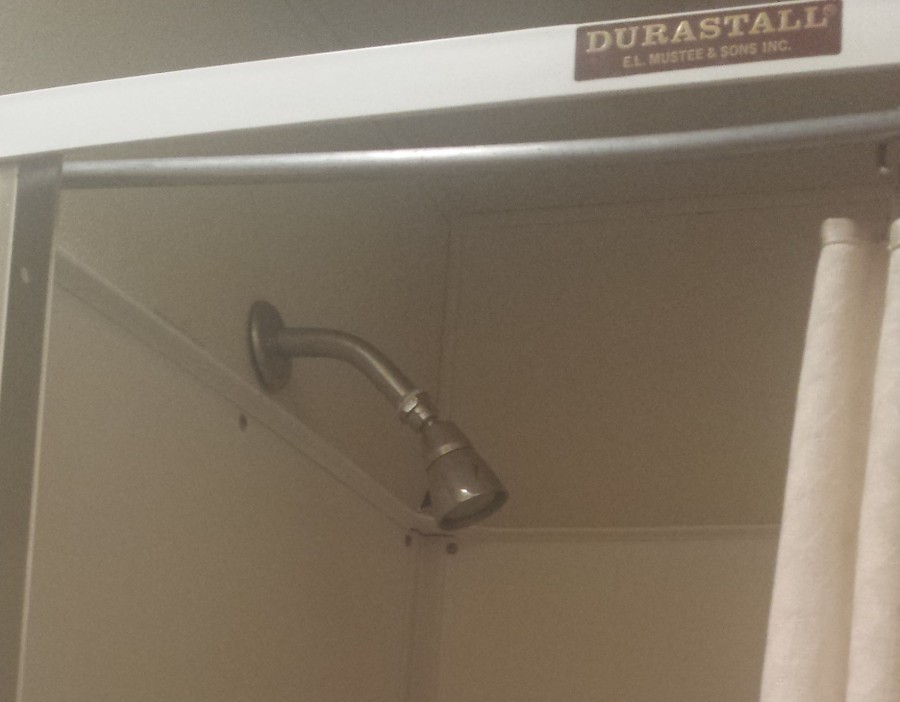Off-campus students win big with Score program
Energy conservation program allows students to learn and save money at the same time
More stories from Trent Tetzlaff
Photo by Trent Tetzlaff
Low flow showerheads like the one seen above are installed by SCORE program auditors in most houses, as most bathrooms in off-campus housing don’t already have them.
December is a stressful time for many UW-Eau Claire students. Not only are final exams and essays on the horizon, but also rising Xcel bills as freezing temperatures roll into the Chippewa Valley.
Students like senior psychology major Melissa Gustavson learned that not everything is glorious when living in off-campus housing.
Gustavson said not only did her house have wiring problems when she first moved in over summer, but it was also poorly insulated.
“I noticed that the wiring was pretty bad right away as I could only have one plug in each outlet,” Gustavson said. “During the summer they also redid the siding and added insulation to help with energy efficiency.”
However, along with rental companies doing their best to comply with students to improve energy efficiency, a student run program joined forces with Xcel Energy in the past five years to lend a helping hand.
The SCORE (Student and Community Outreach on Rental Efficiency) program, now in its fifth year of operation in Eau Claire, is run by the Student Office of Sustainability and works to educate student renters about energy conservation while providing them with the materials free of cost to become efficient, SCORE program Eco-Rep Ian Wetzel said.
Wetzel, a senior environmental public health student, has worked for the program for four years. He said the program consists of eight student auditors who educate renters signed up for the program on energy efficiency and it’s importance.
“How it works is students sign up online for free for audits of their homes with two student auditors,” Wetzel said. “They are almost interviewed in a way about energy efficiency, we then tell them how they can save money, and provide them free of charge with materials to get started.”
Wetzel said the materials they provide students with includes low-flow showerheads, low-flow sink aerators, energy efficient light bulbs as well as a packet of plastic window sealants to help keep heat in the home.
Now after five years of being run strictly by the university and in cooperation with Xcel Energy, the SCORE program has now made the change to no longer be run by Eau Claire and will instead be led by Xcel, Wetzel said.
Xcel, who has footed the programs bill for the past five years, Wetzel said, wants to become more hands on when it comes to the renters’ education, but will continue to employ university students as auditors.
Erik Amundson, a senior business administration student and Student Office of Sustainability management intern, said not only does the program do the routine replacements of showerheads and light bulbs but they also look for other problems in each house they work with, such as refrigerators running at too high of temperatures.
Despite being free of cost and available to all students, Amundson said many still don’t know about what the program offers, however, SCORE has grown considerably year after year.
“The first year we got 30 houses done and since then we have increased every year,” he said. “I know last year we got between 75 and 80 done, which is more than 300 students.”
Although SCORE has grown considerably each and every year, Amundson said it really depends on the program’s relationship with Xcel and how much they are willing to put forth to help it make strides.
Wetzel said the program has allowed many students to become better renters not only as college students, but also better home owners in their future.
“This program really lays a strong foundation for how to be a good student renter and an efficient homeowner in the future,” Wetzel said. “While saving money and energy.”











